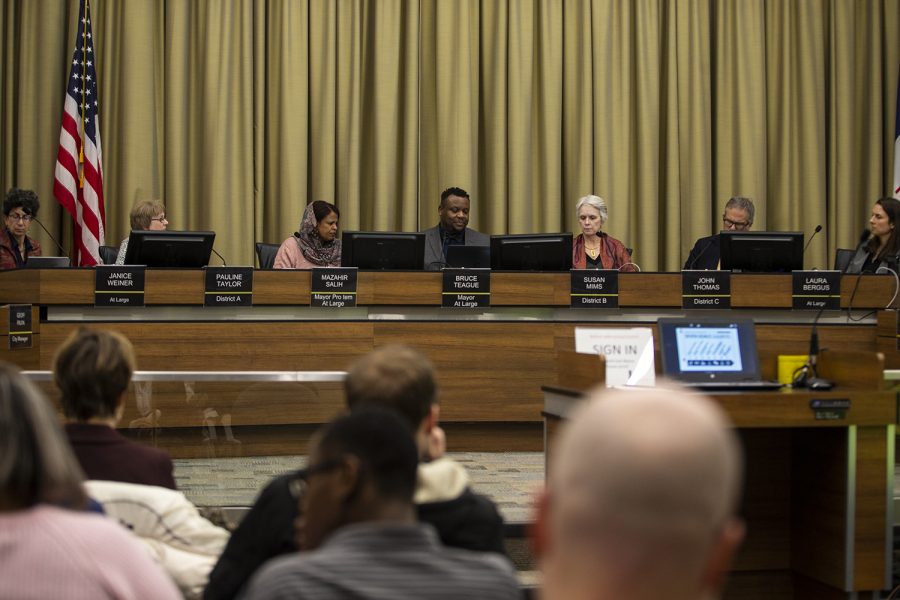Iowa City City Council passes resolution to create Truth and Reconciliation Commission
The commission will address systemic racial inequality in Iowa City, and was met with opposition from Mayor Pro Tem Mazahir Salih who felt black voices were not reflected in the resolution.
Nichole Harris/The Daily Iowan
The Iowa City City Council is seen at an Iowa City City Council meeting on Tuesday, Feb. 18, 2020. (Nichole Harris/The Daily Iowan
September 16, 2020
Iowa City will create a Truth and Reconciliation Commission after weeks of discussion and revisions, despite vocal opposition from Mayor Pro Tem Mazahir Salih, who said “black voices were not being heard” and reflected in the commission’s approved resolution.
The Iowa City City Council voted 6-1 to pass the resolution to create the Truth and Reconciliation Commission on Tuesday night. Salih was the single dissenting vote.
The commission was one of several points the council committed to in a 17-point resolution in June, following widespread protests against police brutality and systemic racism in the city. It was also one of the demands of the Iowa Freedom Riders, the group leading the protests.
According to the resolution, the commission will be tasked with collecting evidence and testimony of racial injustice in Iowa City, providing opportunities for creative expression, and hosting community discussions and learning opportunities on racial injustices in the city.
Salih said the city council had said they were committed to fighting systemic racism and for the Black Lives Matter movement, but she said she doesn’t feel the resolution reflects that.
“We are not taking seriously the recommendations and the amendment by Black people and people who fight for social justice and racial justice in the community, the people who really carefully put this amendment together,” she said. “My voice as a Black person is not there. It’s not. I am not going to stand by a decision while white people make it for ‘black lives matter’. Because clearly it does not support the amendments that the people who proposed this recommendation…this is a Black Lives Matter issue solved by staff and white people on this commission.”
City Councilors Laura Bergus and Janice Weiner have worked with the Iowa Freedom Riders, the Black Voices Project, and other community organizations to revise the specifics of the resolution each time it has been presented to the city council. The resolution presented on Tuesday was the fourth time the resolution appeared before the council.
RELATED: City Council closer to creating commission addressing racial injustice in Iowa City
Weiner said in response to Salih that she understood Salih’s disappointment, but that staff had no part in drafting the resolution. She said she and Bergus took into account multiple inputs and amendments when drafting the resolution and that they felt they ended with a framework in which the commission could grow from.
“Yes, two white women drafted it,” Weiner said. “And we took substantial comments from many Black people, including IFR, including people from the Black Voices Project, including people from the South District, and others. We considered everybody’s amendments. We did the best that we could and that’s what we’re presenting.”
Bergus said that much of the language of the Iowa Freedom Riders’ amendments had made it into the final resolution, and that she and Weiner had taken care to listen to several voices in the process.
Mayor Bruce Teague said he was grateful that the city had the chance to look more closely at systemic racism through this commission, and he expressed frustration with Salih’s concerns.
“I’m going to choose not to respond,” Teague said. “Because I’m quite hurt by Mayor Pro Tem’s comments, but I’m going to choose not to respond.”
RELATED: City Council defers Truth and Reconciliation Commission for a third time after community input
IFR organizer Raneem Hamad said during public comment that she was disappointed in the memo City Attorney Eleanor Dilkes included alongside the revised resolution.
The memo included four amendment proposals from the Iowa Freedom Riders that Dilkes had issues with, including a clause that would give the commission an independent budget from that of the city council’s.
“City Council members are elected and charged with determining how city funds will be spent,” Dilkes wrote in the memo. “IFR’s proposal for the TRC to determine their own mandates and have control of city funds gives them authority that is not envisioned by either the state code or city charter.”
“With respect to the first point in the memo – the proposal of a budget by council – the City Attorney states that funds must be used for the public objective,” Hamad said. “We believe that the [TRC] is Iowa City’s public objective in and of itself, and the proposal of a budget for council approval serves to constrict the TRC.”
Weiner said she was sorry the framework of the commission didn’t fit Salih’s expectations.
“My goal is that this will be a start,” Weiner said. “Not an end, but a start. And that it can be filled with life and help everyone move forward. I’m sorry if it’s not what you were looking for.”



